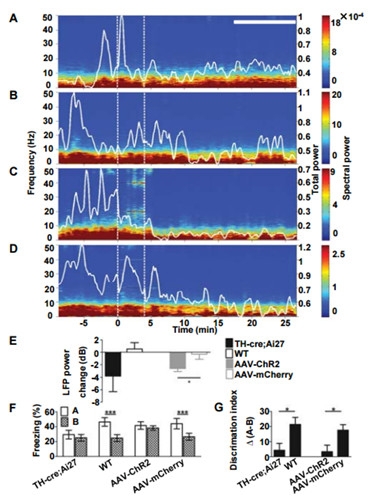On August 30th, the team led by Prof. Mu Yangling in the Department of Physiology, School of Basic Medicine, published a paper online in Proceedings of the National Academy of Sciences of the United States of America (PNAS). The paper is entitled Dopaminergic Inputs in the Dentate Gyrus Direct the Choice of Memory Encoding, which introduces their recent research progress on how the brain reward system controls hippocampus-dependent memory.
Prof. Mu is corresponding author of this paper. The PhD candidate Du Huiyun is first author. The master students Ge Minyan and Song Huina are co-authors. HUST is the institute of the first author and the corresponding author. Prof. Mu’s group has collaborated with co-corresponding author Prof. Fred H. Gage and his team at the Salk Institute, USA.

The VTA is widely implicated in reward circuitry of the brain, in that stimuli with rewarding effect often promote the discharge of dopaminergic neurons in this region and consequently an instantaneous release of dopamine from the synaptic terminals. The increase of dopamine normally associated with positive emotions has been well known to regulate various forms of learning and memory (e.g. stimulus-response association learning, reinforcement learning and working memory etc.). However, it remains elusive how dopamine can influence the so called episodic memory that relies on the hippocampal formation. Utilizing a combination of optogenetics, in vivo and in vitro electrophysiological techniques as well as behavioral tests, Prof. Mu’s team explored the role of dopamine in the dentate gyrus of the hippocampus and the underlying mechanisms. By controlling electrical activities of dopaminergic neurons in the VTA with the optogenetic tool to mimic reward-induced dopamine release, they found that dopamine signals induced a long-term depression of cortical inputs to the dentate gyrus and diminished theta oscillations in this area. In subsequent behavioral experiments, preexposure to a natural reward suppressed hippocampus-dependent memory formation, with an effective time window consistent with the duration of dopamine-induced changes of dentate activity. This result indicates that dopamine in the dentate gyrus may impair postreward learning and reduce the interference of subsequent events, thereby allowing the preferential encoding of information received before reward into memory. Overall, this study offers a new thought for studying regulation of hippocampus-dependent memory by dopamine.
This project was supported by National Natural Science Foundation of China Grant 91332106 and the Fundamental Research Funds for the Central Universities (Huazhong University of Science and Technology Grant 2014TS059). This research presents another crucial breakthrough made by Prof. Mu in her study on neural mechanisms of learning and memory since her former paper published in ELife in October, 2015.
